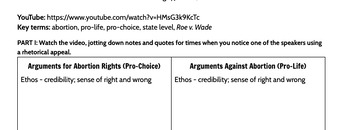Rhetorical Appeals (Ethos, Pathos, Logos) in the Abortion Debate
- Google Docs™

Description
This notetaker provides a YouTube link to a discussion (8m38s) featured on CBS between members of the pro-life and pro-choice movements. Students watch the video, taking down notes in the graphic organizer for when they hear statements made using each of the rhetorical appeals (ethos, pathos, logos). Students then process what they watched by writing a scaffolded statement summarizing a key argument by one speaker on each side. This will undoubtedly inspire some rich discussion on both sides of this hot-button issue.
It's assumed that your students would have already studied the rhetorical appeals, but definitions are provided. The document can also be modified to focus simply on pro and con arguments.
Answers will vary, so it is suggested that you preview the video to have some examples in mind in case your students struggle with the video.


